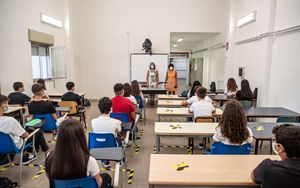(Finance) – Some decidedly worrying news: the preparation of students around the world is collapsing vertically. In fact, according to the OECD PISA report (a three-year survey conducted on fifteen-year-old students from all over the world which highlights the extent to which they have acquired fundamental knowledge and skills to participate fully in social and economic life), the average performance in OECD countries dropped by 16 points in mathematics and 11 points in reading. This equates to approximately half a school year in reading and three-quarters of a school year in math. The only positive note is that the average performance in science did not undergo significant changes. The motivation may not only be the Covid: analysis of trends before 2018 reveals that reading and science achievement began declining well before the pandemic; this indicates that longer-term issues are also at play.
Sore point for Italy which is the country with the greatest difference between girls and boys in terms of learning mathematics: in this subject students outperformed female students by 21 points. This difference is the highest ever among all participating countries.
Conversely, in reading, girls scored 19 points higher than boys. Compared to the previous cycle, these differences remained essentially stable. Both in the different geographical macro areas, both in the different fields of study, the boys obtained a higher score in mathematics than the girls.
In two decades of Pisa tests, the average OECD score has undergone very limited variations between one cycle and another, with a maximum of four points in mathematics and five points in reading. The drastic drop in results suggests a negative shock that hit many countries at the same time, and Covid-19 – the researchers note – would seem to be an obvious factor.
However, analysis of trends in Pisa results before 2018 reveals that reading and science results began to decline well before the pandemic. In these areas, performance peaked in 2012 and 2009 respectively, before declining. This indicates that longer-term issues are also at play. The study highlights how some countries are bucking the trend of long-term decline: Colombia, Macau (China), Peru and Qatar have improved on average in all three subjects since they began participating in Pisa. In many other countries/economies, student outcomes have remained stable over time.
